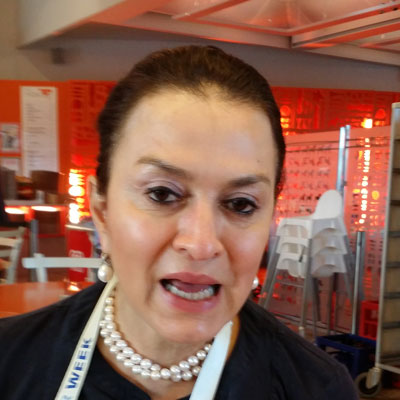- ON THE DECADE
- THE DECADE'S CAMPAIGN
- REPORTING ON PROGRESS
- THE DECADE'S PROGRAMMES
- FOCUS AREAS
-
- Access to sanitation
- Financing water
- Gender and water
- Human right to water
- Integrated Water Resources Management
- Transboundary waters
- Water and cities
- Water and energy
- Water and food security
- Water and sustainable development
- Water and the green economy
- Water cooperation
- Water quality
- Water scarcity
- FOCUS REGIONS
- RESOURCES FOR
- UN e-RESOURCES
Water for Life Voices
Voices of Experts
Maureen Ballesteros
Global Water Partnership (GWP) Latin America and the Caribbean

"Ten years ago (beginning of 2000s), the water subject, despite it being important, wasn’t so relevant. I think there have been various factors that, without a doubt, have had an influence on this: global movements as Rio or Dublin; obviously, global forums have raised awareness on the importance of an adequate management of the resource; and I also feel that the existence of increasing problems, either competence and conflict problems, has increasingly become more severe in this period, so the need find a solution on the efficient water use conflict has grown.
Latin America has become conscious that, despite it being a region with plentiful water resources, it is a region with an important population growth —which means greater needs to accelerate the rate of provision of services, for example, drinking water.
Because we made the change from a poor to a middle-class region with an aspiration potential that goes way further than having a fountain every 300 m or a latrine, people in Latin-America, aspire to have water and sanitation at their homes. So the aspirations reflect demands of their Governments.
In the 90s we started to work on legal reforms, institutional reform, we outlined draft laws in all Congresses of Center-America; and we supported a major exchange: Brazil had passed its law in 1997 and it was a great encouragement and became a role model to all Latin-American countries. It is a region where institutions have been reformed, and very important legal reforms have been done in most of the countries. But, regarding the improvement of water governance this is still a challenge in Latin-America.
The greatest of my contributions was working with the deputies who were in charge of water legal reforms and water law passing in Honduras, Nicaragua and, after, Costa Rica. So, one cannot say that this is nothing: the needs are many and when one looks forward sometimes feels overwhelmed; but if you look back 10 years ago, we have in fact improved.
What we actually have to do for the future is to leave the water box and work much more with the decision-makers whom have the influence to direct the investments. For example, Latin-America invests 0.5% of its countries GDP in water infrastructures. We all talk about it and we say it between us, aguateros, because, obviously, we are all conscious of this; but we spoke to the Finance Minister and they have enough priorities before water. The main topic is how to make them understand how water boosts development. "
>> Intro
>> Progress
>> Pride
>> Hope
>> Your Voice
>> End
>> Full Exhibition
>> Ecosystems
>> Empowering communities
>> Food security
>> Gender and water
>> Groundwater
>> Hygiene
>> Open defecation
>> Participation
>> Sustainable development
>> Water and culture
>> Water and disasters
>> Water and energy
>> Water and health
>> Water for cities
>> Water efficiency
>> Water quality
>> Water scarcity
>> Voices of experts
>> Voices from business
>> Voices from the civil society
>> Voices from the field: case studies
>> Africa
>> Asia and the Pacific
>> Europe
>> Latin America and the Caribbean
>> Middle East
>> Oceania
>> Decade’s achievements. From MDGs to SDGs
>> Five years of UN-Water "Water for Life"
Awards 2011-2015
>> Water for Life Voices
Copyright | Terms of use | Privacy notice | Site Index | Fraud alert | Help




